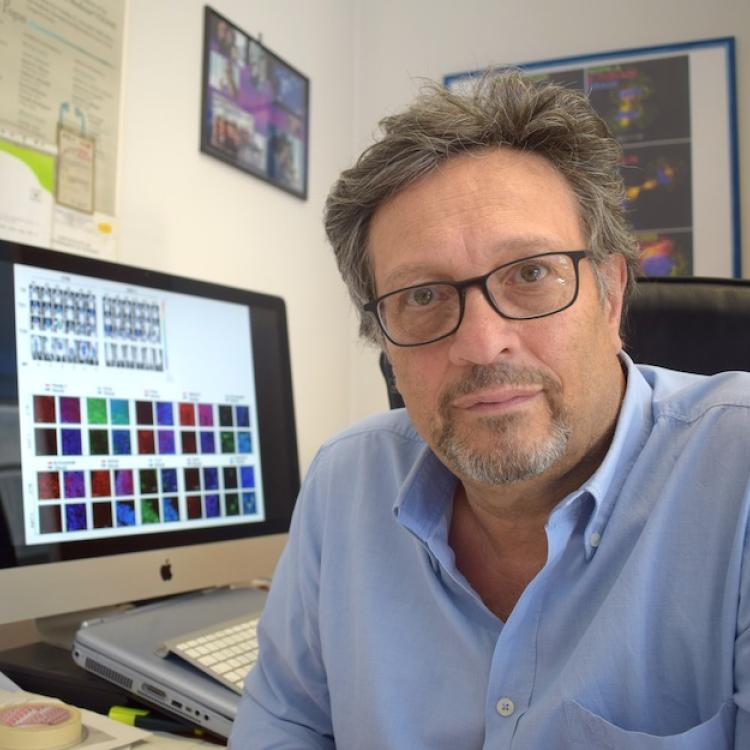
Massimo Zollo
Full Professor Genetics (Dept. DMMBM) University Federico II Naples, Italy
Principal Investigator CEINGE and Director of the “CNS lab-diagnostics” CEINGE and Coordinator of Clinical Pathology and Cytogenetics facility at CEINGE.
Expert in Functional Genomics applied to Human Genetics and Molecular Oncology in brain development disorders and cancer. In 2006 he became Associate Professor (Genetics Bio-18) teaching Genetics at University Federico II of Naples, in Biotechnology Medical School, and Principal Investigator at CEINGE by directing his own laboratory. Since 2018 he is Full Professor of Genetics at the University Federico II of Naples, Department of Molecular Medicine and Medical Biotechnology (DMMBM), Principal Investigator at CEINGE Director of the “CNS-lab”, and Coordinator of the Facility “Clinical Pathology and Cytogenetics in Oncology and Haematology” at CEINGE.
Our Research team focus is on Human Molecular Genetics discoveries within the following studies:
i) gene identification causing inherited Brain NeuroDevelopmental diseases
ii) identification of somatic mutations responsible for tumorigenesis and metastasis in brain tumors ì (mostly paediatric tumors).
We are performing three main Researches activities which are then linked to a Diagnostic line “in service” at our AOU Federico II- CEINGE platforms
1. Studies related to neurodevelopmental diseases highlighting the identification of a new causative gene disorders responsible of Microcephaly and Tubulinopathies. These studies are mainly related to genotype/phenotype analyses and their correlation to brain malformations due to neural cell proliferation defects, cell mitosis involving microtubules polymerization disfunctions at spindle formation and cellular abscissions.
2. Studies related to define the mechanisms of transformation of a “normal into a cancer cell” studying its metastatic behavior by identifying its communications with immune system cells with escape mechanism of immune-surveillance and immune-editing both linking the results to epigenetics DNA modifications.
3. Studies related to the developing of new therapeutic strategies in the field of Cancer Genetics and Human Genetics by confirming in vitro data in in vivo analyses in mice models (brain model of cancer “pre-clinical-proof of concept studies” and brain genetically modified animal models mimicking neurodevelopmental disorders, including neuro-degeneration).
4. In the fight against Sars-Cov-2, the laboratory is carrying out studies to identify (a) new rapid patterns of virus detection, (b) genetic studies to identify the role of disease-related genes in asymptomatic, and finally (c) studies functional to identify the mechanisms of new anti-viral drugs that inhibit the entry and replication of the Sars-Cov-2 virus in primary human cells.
(a) SARS-CoV-2 Subgenomic N (sgN)
Regulatory Noncoding and Predicted Pathogenic Coding Variants of CCR5 Predispose to Severe COVID-19
(c) Long-chain polyphosphates impair SARS-CoV-2 infection and replication - summary - abstract - reprint - full text
Novel human neutralizing mAbs specific for Spike-RBD of SARS-CoV-2
1 - Veronica Ferrucci RTDa (Bio-18 - Genetics - DMMBM, University Federico II, Naples)
2 - Pasqualino De Antonellis Research Associate (Bio-18 - Genetics - DMMBM, University Federico II, Naples)
3 - Fatemeh Asadzadeh (PhD SEMM - CEINGE)
4 - Roberto Siciliano (Research Assistant - CEINGE)
5 - Francesca Bibbo' (PhD DMMBM, University Federico II, Naples)
6 - Carmen Surice (Research Assistant - DMMBM, University Federico II, Naples)
1- SARS-CoV-2 Subgenomic N (sgN) diagnostics and therapy
Ferrucci V, de Antonellis P, Quarantelli F, Asadzadeh F, Bibbò F, Siciliano R, Sorice C, Pisano I, Izzo B, Di Domenico C, ... and Zollo M. Loss of Detection of sgN Precedes Viral Abridged Replication in COVID‐19‐Affected Patients–A Target for SARS‐CoV‐2 Propagation. Int. J. Mol. Sci. 2022, 23, 1941.
Zollo M, Ahmed M, Ferrucci V, Salpietro V, Asadzadeh F, Carotenuto M, Maroofian R, Al-Amri A, Singh R, Scognamiglio I, Mojarrad M, Musella L, Duilio A, Di Somma A, Karaca E, Rajab A, Al-Khayat A, Mohan Mohapatra T, Eslahi A, Ashrafzadeh F, Rawlins LE, Prasad R, Gupta R, Kumari P, Srivastava M, Cozzolino F, Kumar Rai S, Monti M, Harlalka GV, Simpson MA, Rich P, Al-Salmi F, Patton MA, Chioza BA, Efthymiou S, Granata F, Di Rosa G, Wiethoff S, Borgione E, Scuderi C, Mankad K, Hanna MG, Pucci P, Houlden H, Lupski JR, Crosby AH, Baple EL. Brain. 2017 Apr 1;140(4):940-952. doi: 10.1093/brain/awx014.PMID:28334956
Ferrucci V, de Antonellis P, Pennino FP, Asadzadeh F, Virgilio A, Montanaro D, Galeone A, Boffa I, Pisano I, Scognamiglio I, Navas L, Diana D, Pedone E, Gargiulo S, Gramanzini M, Brunetti A, Danielson L, Carotenuto M, Liguori L, Verrico A, Quaglietta L, Errico ME, Del Monaco V, D'Argenio V, Tirone F, Mastronuzzi A, Donofrio V, Giangaspero F, Picard D, Remke M, Garzia L, Daniels C, Delattre O, Swartling FJ, Weiss WA, Salvatore F, Fattorusso R, Chesler L, Taylor MD, Cinalli G, Zollo M. Brain. 2018 May 1;141(5):1300-1319. doi: 10.1093/brain/awy039. PMID: 29490009.
4- The phenotypic and molecular spectrum of PEHO syndrome and PEHO-like disorders.
Salpietro V, Zollo M, Vandrovcova J, Ryten M, Botia JA, Ferrucci V, Manole A, Efthymiou S, Al Mutairi F, Bertini E, Tartaglia M; SYNAPS Study Group, Houlden H. Brain. 2017 Aug 1;140(8):e49. doi: 10.1093/brain/awx155. No abstract available. PMID:28899015
5- Genetics of recurrent medulloblastoma.
Zollo M. Lancet Oncol. 2013 Nov;14(12):1147-8. doi: 10.1016/S1470-2045(13)70482-0. Epub 2013 Oct 17. PMID:24140202
